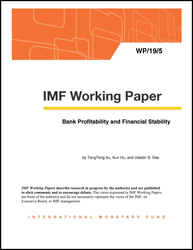
Bank Profitability and Financial Stability
We analyze how bank profitability impacts financial stability from both theoretical and empirical perspectives. We first develop a theoretical model of the relationship between bank profitability and financial stability by exploring the role of non-interest income and retail-oriented business models. We then conduct panel regression analysis to examine the empirical determinants of bank risks and profitability, and how the level and the source of bank profitability affect risks for 431 publicly traded banks (U.S., advanced Europe, and GSIBs) from 2004 to 2017. Results reveal that profitability is negatively associated with both a bank’s contribution to systemic risk and its idiosyncratic risk, and an over-reliance on non-interest income, wholesale funding and leverage is associated with higher risks. Low competition is associated with low idiosyncratic risk but a high contribution to systemic risk. Lastly, the problem loans ratio and the cost-to-income ratio are found to be key factors that influence bank profitability. The paper’s findings suggest that policy makers should strive to better understand the source of bank profitability, especially where there is an over-reliance on market-based non-interest income, leverage, and wholesale funding.
Publication date: January 2019
ISBN: 9781484390078
$18.00
Add to Cart by clicking price of the language and format you'd like to purchase
Available Languages and Formats
| English |
Prices in red indicate formats that are not yet available but are forthcoming.
Topics covered in this book
This title contains information about the following subjects.
Click on a subject if you would like to see other titles with the same subjects.
Finanical stability , bank profitability , systemic risk , non-interest income , business model , panel regression
Summary
Copyright © 2010 - 2026
Powered by:
AIDC



